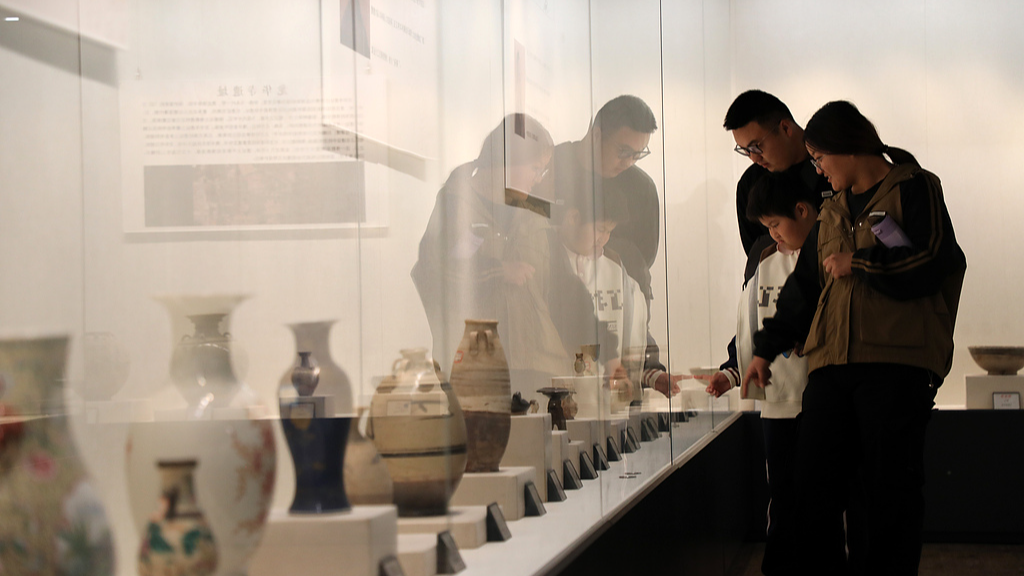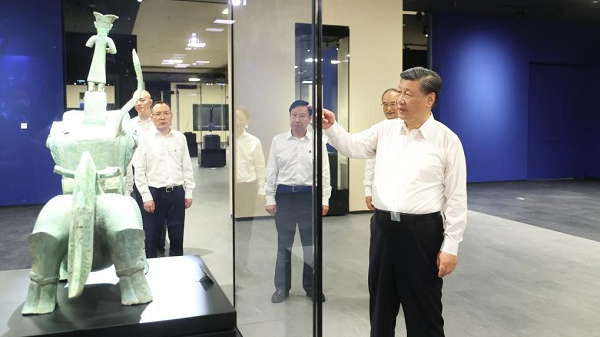
Visitors look at artifacts at the Museum of Boxing County in Binzhou City, east China's Shandong Province, October 5, 2024. /CFP
Visitors look at artifacts at the Museum of Boxing County in Binzhou City, east China's Shandong Province, October 5, 2024. /CFP
As China's National Day holiday wraps up, people have flocked to cities and attractions rich in cultural heritage. According to data from Trip.com, four out of the five most searched themes during this holiday are culture-related, highlighting a strong interest in "Traveling with Textbooks," popular museums, music festivals and study tours.
The concept of "Traveling with Textbooks" involves parents taking their children to visit cities or sites featured in their school materials. For instance, some have visited Tsinghua University, inspired by renowned Chinese poet Zhu Ziqing's "Moonlight over the Lotus Pond," or traveled to Fenghuang Ancient Town in central China's Hunan Province after reading Shen Congwen's "Border Town." Shen is one of China's great modern writers.
Additionally, tourism has been heavily influenced by films and video games. For example, fans of the TV series "To the Wonder" are drawn to Altay, a county-level city in northwest China's Xinjiang Uygur Autonomous Region, while some explore north China's Shanxi Province, inspired by the popular game "Black Myth: Wukong." Shanxi features the most filming locations from the game.
Museum visits have also surged. For instance, the Sanxingdui Museum in Sichuan Province recently launched the country's first immersive VR experience of an archaeological site, leading to tickets being sold out during the holiday.
In recent years, as China's economy and society have rapidly developed, people have placed greater emphasis on cultural and spiritual life. This shift in travel preferences reflects a growing appreciation for traditional Chinese culture and an increasing confidence in national identity.
Chinese President Xi Jinping once said, "Culture is the soul of a nation. A country will only thrive if its culture thrives, and a nation will be strong only if its culture is strong. Without high cultural confidence and cultural prosperity, there can be no great rejuvenation of the Chinese nation." He made this statement during a report to the 19th National Congress of the Communist Party of China (CPC) in October 2017.

Chinese President Xi Jinping visits the Sanxingdui Museum in Deyang City, southwest China's Sichuan Province, July 26, 2023. /Xinhua
Chinese President Xi Jinping visits the Sanxingdui Museum in Deyang City, southwest China's Sichuan Province, July 26, 2023. /Xinhua
Making China a culturally strong country
Xi has consistently advocated for the importance of Chinese culture and nurturing cultural confidence and prosperity in the new era. Since 2012, he has visited numerous cultural sites and articulated various strategies for cultural development. In October 2023, at a key meeting in Beijing, Xi's Thought on Culture was formally introduced. Theorists state that the establishment of this thought shows that the Party's historical and cultural confidence has reached new heights.
Under Xi's leadership, China has intensified efforts to transform the nation into a country with a strong socialist culture. In 2022, the 20th CPC National Congress set the goal of establishing a powerful cultural nation with significant soft power by 2035. Following this meeting, the central government issued a five-year plan for cultural development, outlining plans to boost cultural industries over the next five years, enhance public cultural services, and deepen the integration of culture and tourism. The plan also aims to improve the moral and scientific literacy of the populace and increase the global influence of Chinese culture, fostering deeper exchanges and dialogues between nations.
Guided by Xi's cultural vision, China is focusing on preserving cultural relics, safeguarding intangible heritage, promoting free access to libraries and museums, and bridging cultural gaps between urban and rural areas. Internationally, it has initiated various programs for civilizational dialogue and cultural exchange.
In September this year alone, China hosted a series of vibrant cultural exchange events, including the 2024 Media Cooperation Forum on Belt and Road, the Forum on China–Africa Cooperation (FOCAC), the Beijing Cultural Forum, and the 7th Silk Road (Dunhuang) International Cultural Expo.
Xi has also shown great interest in the cultures of other countries, emphasizing the importance of mutual learning and respect for different civilizations.
Since taking office, Xi has traveled to more than 70 countries. While visiting the Parthenon in Greece, he was told that a statue reflects the idea that "man is the measure of all things" before making a reference to an ancient Chinese saying that emphasizes "taking people as the foremost." In Belgium, he compared Chinese tea to Belgian beer, highlighting the importance of valuing diverse cultures. In Mexico, he expressed interest in the parallels between aspects of Maya civilization and Chinese symbols, such as the dragon.
At FOCAC, Xi pledged that "China will champion mutual respect, inclusiveness and coexistence of different civilizations on our way to modernization, and strive together for more fruitful outcomes under the Global Civilization Initiative."



